Earlier this month, Heidi Groshelle invited me as a keynote speaker to the ExecEvent organized by Greg Duplessie — it is an exclusive networking event for industry executives focusing on the data storage marketplace. I was asked to share tips and tricks about being an executive. Vast topic! So I decided to address only one theme: Reinvent yourself continuously to create your own A-Team.
 When I came from France to Silicon Valley in the late 1980s to found a tech startup, I learned one key thing: that what I knew was nothing compared to what I didn’t know… Since then this has been my motto. As counter-intuitive as this may be, I would say that keeping one’s self confidence in check helps to continuously rekindle creativity and develop new tools of self-reliance. I am glad that more researchers start to emphasize the power of “less-confidence.” I mentioned a great piece by Tomas Chamarro-Premusic, Professor of Business Psychology in London (UCL), for HBR: Less-Confident People can be More Successful. My take-away: Confidence that you have built over the years relates to what you did, not what you will do.
When I came from France to Silicon Valley in the late 1980s to found a tech startup, I learned one key thing: that what I knew was nothing compared to what I didn’t know… Since then this has been my motto. As counter-intuitive as this may be, I would say that keeping one’s self confidence in check helps to continuously rekindle creativity and develop new tools of self-reliance. I am glad that more researchers start to emphasize the power of “less-confidence.” I mentioned a great piece by Tomas Chamarro-Premusic, Professor of Business Psychology in London (UCL), for HBR: Less-Confident People can be More Successful. My take-away: Confidence that you have built over the years relates to what you did, not what you will do.
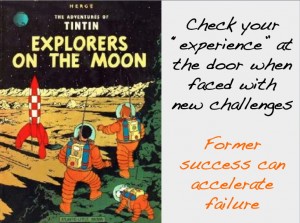 Yes, it’s hard to check your experience at the door… But consider this: The experience that we have acquired in a job may be valuable, but more often than not, this same experience may encourage us to operate on automatic pilot, and therefore can prevent us from seeing what’s new or what should be different. Tintin’s moon mostly resembles the Alps without the trees, and his vehicle is more like a tank — nothing in common with Lunar Roving Vehicles (LRV) of the Apollo missions. Checking your experience at the door means, in practice, letting the scales fall from your eyes. After one year in any job, these scales are forming fast… My take-away: While it’s a cliché to say that a failure can accelerate success, it’s also true that former success can cause failure.
Yes, it’s hard to check your experience at the door… But consider this: The experience that we have acquired in a job may be valuable, but more often than not, this same experience may encourage us to operate on automatic pilot, and therefore can prevent us from seeing what’s new or what should be different. Tintin’s moon mostly resembles the Alps without the trees, and his vehicle is more like a tank — nothing in common with Lunar Roving Vehicles (LRV) of the Apollo missions. Checking your experience at the door means, in practice, letting the scales fall from your eyes. After one year in any job, these scales are forming fast… My take-away: While it’s a cliché to say that a failure can accelerate success, it’s also true that former success can cause failure.
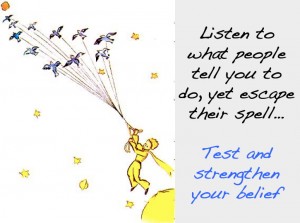 Sure, you may feel lonely when you start something new, and the temptation is to hold on to what you know, or find reassurance from people “who know more.” While it’s good to listen to the experience of others, it’s equally critical to make sure that they are not affected by their own Tintin syndrome. When I started my first company, I was advised to hire “seasoned executives” with 10 years of experience… Even though desktop software was new, even though Macintosh was really new, it was already the craze to hire “industry veterans.” I was not used to business verbiage and was scratching my head. There were no veterans in the Apple world… and the self-proclaimed veterans hated the Mac and were shouting that Apple was doomed to fail. My take-away: Seasoned executives may be great, but they may also have vested interest in the past. So watch for the birds that can help you move towards new skies.
Sure, you may feel lonely when you start something new, and the temptation is to hold on to what you know, or find reassurance from people “who know more.” While it’s good to listen to the experience of others, it’s equally critical to make sure that they are not affected by their own Tintin syndrome. When I started my first company, I was advised to hire “seasoned executives” with 10 years of experience… Even though desktop software was new, even though Macintosh was really new, it was already the craze to hire “industry veterans.” I was not used to business verbiage and was scratching my head. There were no veterans in the Apple world… and the self-proclaimed veterans hated the Mac and were shouting that Apple was doomed to fail. My take-away: Seasoned executives may be great, but they may also have vested interest in the past. So watch for the birds that can help you move towards new skies.
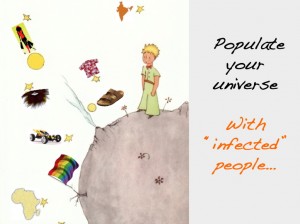 You can’t lead alone, except when you are a dictator (and want to die a violent death). So, how do you surround yourself? “Hire ‘infected’ people,” to use great expression by my friend Guy Kawasaki in The Art of the Start: “It’s often easier to teach an infected candidate how to do a job than to teach an agnostic (or atheist) how to believe.” This is true for startups, of course, but also for large corporations who want to innovate again. I can safely say that my various companies had the most diverse people. None was born “seasoned,” and all turned out to be extremely effective. These people were not connected to one another because of their background or their education. They were connected to one another because of a common purpose. My takeaway: Unity doesn’t mean uniformity. Diversity creates vibrant and energetic companies.
You can’t lead alone, except when you are a dictator (and want to die a violent death). So, how do you surround yourself? “Hire ‘infected’ people,” to use great expression by my friend Guy Kawasaki in The Art of the Start: “It’s often easier to teach an infected candidate how to do a job than to teach an agnostic (or atheist) how to believe.” This is true for startups, of course, but also for large corporations who want to innovate again. I can safely say that my various companies had the most diverse people. None was born “seasoned,” and all turned out to be extremely effective. These people were not connected to one another because of their background or their education. They were connected to one another because of a common purpose. My takeaway: Unity doesn’t mean uniformity. Diversity creates vibrant and energetic companies.
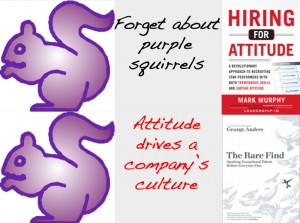 After hiring a few hundred people myself over the last 25 years, I realized that I never looked for the perfect resume. More exactly, I was discouraged by resumes very early on, because they were full of what I later discovered were called “key words.” When I was asking the candidates what they meant, I was regularly disappointed. So basically I always ended up “hiring for attitude” to use the title of Mark Murphy’s book. I never looked for the “purple squirrel” considering that when people have a passion, they learn fast. Training new employees is far more cost-effective that experiencing high turnover, anyway. Now that I am in the HR industry as the CEO of TalentCircles, I am finding out that turnover is even worse than I thought: “46% of people hired in 2012 will fail within the first 18 months on the job,” and “an astounding 89% of the time, employees fail for attitudinal reasons, and only 11% of the time because of skill.” Also, of course, I recommended George Anders’ remarkable essay, “The Rare Find.” My take-away: In practice, spotting talent before everybody else is the ability to help people develop their potential.
After hiring a few hundred people myself over the last 25 years, I realized that I never looked for the perfect resume. More exactly, I was discouraged by resumes very early on, because they were full of what I later discovered were called “key words.” When I was asking the candidates what they meant, I was regularly disappointed. So basically I always ended up “hiring for attitude” to use the title of Mark Murphy’s book. I never looked for the “purple squirrel” considering that when people have a passion, they learn fast. Training new employees is far more cost-effective that experiencing high turnover, anyway. Now that I am in the HR industry as the CEO of TalentCircles, I am finding out that turnover is even worse than I thought: “46% of people hired in 2012 will fail within the first 18 months on the job,” and “an astounding 89% of the time, employees fail for attitudinal reasons, and only 11% of the time because of skill.” Also, of course, I recommended George Anders’ remarkable essay, “The Rare Find.” My take-away: In practice, spotting talent before everybody else is the ability to help people develop their potential.
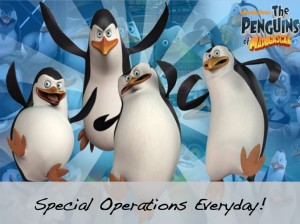 Hiring for attitude means finding your “brown shorts,” the people who will really be able to contribute to your team: a Southwest interviewer had asked pilot interviewees to wear the company’s Summer uniform (brown Bermuda shorts instead of formal pants). The candidates refusing to wear the shorts showed that they were not a good fit. I never had any specific name to my various teams. Call yours the “penguins of Madagascar” if you want. Skipper, Kowalski, Rico and Private are cute-looking penguins, but with unique commando skills. They will make competitors “crazy” and make customers fall in love. And each is a true evangelist of the company’s culture, both inside and outside, and so committed to the cause that you can let them talk on social networks. My take-way: Let your team speak on social media channels. As they communicate, they also learn what’s going on in the industry. If they don’t, you may be running a nursing home.
Hiring for attitude means finding your “brown shorts,” the people who will really be able to contribute to your team: a Southwest interviewer had asked pilot interviewees to wear the company’s Summer uniform (brown Bermuda shorts instead of formal pants). The candidates refusing to wear the shorts showed that they were not a good fit. I never had any specific name to my various teams. Call yours the “penguins of Madagascar” if you want. Skipper, Kowalski, Rico and Private are cute-looking penguins, but with unique commando skills. They will make competitors “crazy” and make customers fall in love. And each is a true evangelist of the company’s culture, both inside and outside, and so committed to the cause that you can let them talk on social networks. My take-way: Let your team speak on social media channels. As they communicate, they also learn what’s going on in the industry. If they don’t, you may be running a nursing home.
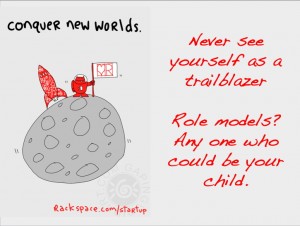 I love this cartoon created by Hugh MacLeod for Rackspace and its “Rackers,” where the Little Prince is a cosmonaut and Tintin’s space shuttle, a hybrid of nature and culture. My take-way: Even large companies can think like startups.
I love this cartoon created by Hugh MacLeod for Rackspace and its “Rackers,” where the Little Prince is a cosmonaut and Tintin’s space shuttle, a hybrid of nature and culture. My take-way: Even large companies can think like startups.

4 responses so far ↓
1 Joanna Clark // Jul 27, 2012 at 10:48 am
Marylene,
This is outstanding! Thank you for your always mind expanding pieces… this one will be required reading for my team!
Joanna
2 ann // Jul 27, 2012 at 1:40 pm
When I think of you Marylene, I think of a flower bursting into bloom. You are always alive, and giving, inventive and passionate. I always seek out people who have a natural wonderment and a deep curiosity about life in general – and not just in workmates but in friendships too. You embody those qualities! And you will be forever young in your attitude, despite being finely seasoned.
Merci, mon ami!
3 Rayanne Thorn // Jul 27, 2012 at 2:04 pm
Awesome post, Marylene!
I am so glad to have crossed paths with you and to be able to stay in contact via social media channels.
There is so much to learn in this life and like you – I feel like I am just getting started!
As I near my 50s, (just one year away!) I realize your first point – I know so much less than I don’t know…
Kind of exciting actually, it means there is still much for me to do!
Thanks!
-Rayanne
4 Sam Lounis De Brouwer // Jul 28, 2012 at 7:58 am
Hi Marylene,
We just met, and now I discover your blog. I have always been excited by the “we don’t know what we don’t know” equation. Love the humility and wisdom of your take aways: thank you!
Sam
Leave a Comment